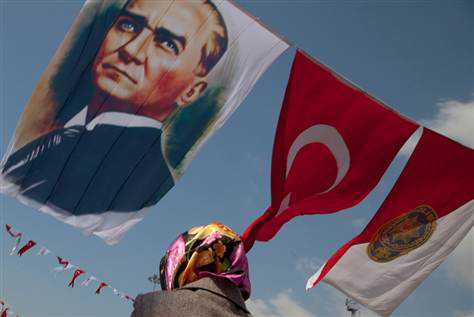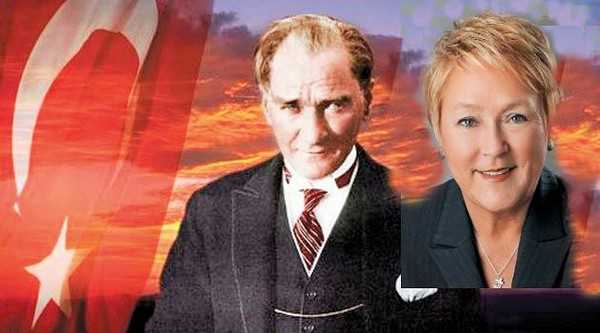
Douglas Todd argues that, properly understood, secularism is the best thing that has happened for modern religion and religious believers, and that secular societies can be breeding grounds for religious pluralism.
Secularization is the best thing that’s ever happened to religion. That might seem like a shocking statement for both religious and secular people. But its implications become clear when we unpack new understandings of secularization. Canada is often called one of the world’s more “secular” countries. Observers like me use the term because Canada, especially B.C., has among the highest proportion of residents who say they have “no religion,” i.e., don’t attend a church, synagogue, mosque or temple.
But it’s time to get beyond a narrow understanding of secularization. We need not restrict it to the separation of “church and state” and to describing how an increasing number of people are rejecting formal religion.
A growing collection of philosophers and theologians, including Canada’s Charles Taylor, author of A Secular Age, maintain we have to move beyond understanding secularization merely as a process of “subtraction,” “loss” and “disenchantment.”
I support such thinkers’ efforts to re-define secularization – as a social development by which religion loses its state-sanctioned authority and moral absolutism (as the Catholic Church once functioned in Europe and Quebec). Secularization is creating societies in which religion is treated as one option among many.
The word “secular” now has as many different meanings as “love” and “spirituality.” Because there is a great deal of confusion about it, Britain’s Guardian newspaper ran a five-part series on secularism in June.
At prestigious Pitzer College in Claremont, Calif., Professor Phil Zuckerman is starting this fall to offer a bachelor’s degree in secularism. In Cambridge, Mass., Trinity College has a vibrant Institute for the Study of Secularism in Society.
These media and scholarly outlets are going far beyond the one-dimensional cheerleading for secularism led by Richard Dawkins, Christopher Hitchens and Sam Harris, who believe society advances only when religion is eradicated.
In contrast, I strongly endorse the emerging argument that secularization leaves open a great deal of room for new forms of religion and spirituality. Whether in Canada, India or Brazil, secular societies can be fertile places for spiritual expression in a pluralistic context.
One of the most welcome and quoted new books on the subject is Taylor’s A Secular Age, an 896-page opus that argues that secularization has been largely positive – as long as it leaves open a “window on the transcendent.”
The spiritual and religious impulse in humans will never die, says Taylor. Even if religion doesn’t dominate a society, as it once unfortunately did in Europe and elsewhere, people will always seek the transcendent; something ultimate, larger than themselves.
The great sociologist of religion, Robert Bellah, author of Habits of the Heart, says what is needed most now is new forms of religion that work in a secular age, where they are subject to analysis and don’t rely on political endorsement.
We are seeing this today. Many open-minded forms of Christianity, Judaism, Buddhism and of smaller spiritual movements, including meditation, yoga and healing, are maintaining a sense of the transcendent in some secular, pluralistic societies.
We can partly thank the Enlightenment for the rise of secularism, with the era’s emphasis on freethinking, rationality and science. But many thinkers, including 19th century sociologist Max Weber, also credit the advance of secularism to Protestantism.
The Protestant Reformation rejected the absolute authority claimed by the Roman Catholic church of the time. It brought a new wave of reform, choice and intellectual questioning to Christianity. By the 19th century, Protestants were critically analysing the Bible and trying to discern the difference between the “historical Jesus” and the Christ of unquestioned mythology.
This so-called “critical method” wasn’t an attack on the faith, as some traditionalistic Christians continue to argue today. But it was what many consider a valid attempt to challenge the taboos that surrounded Christian orthodoxy.
In his new book, Spiritual Bankruptcy (Abingdon Press), philosopher John Cobb Jr. maps out some of the pros and cons of secularism.
Cobb believes the religions and philosophies that took root in the so-called Axial Age, about 500 years before Jesus of Nazareth, began as “secularizing” movements. Early Judaism, Buddhism and Greek philosophy challenged the religious authorities of their day, condemning hypocrisy and superstition.
The fiery Hebrew prophets, who denounced injustice and royal arrogance at every turn, were profound secularizers, according to the refreshing definition provided by Cobb, director of the Centre for Process Studies in Claremont, Calif.
Secularization does away with taboos, Cobb says. “It does not give any privileged authority to tradition.”
However, reforming movements often develop followers. And they can frequently turn a positive secularizing trend into a static religion or ideology, which tries to create divisions between “us” and “them.”
The early Jesus movement was highly critical of Jewish leaders’ strict adherence to religious laws. Later, however, Cobb says, much of the Jesus movement turned into what he calls “Christianism.”
Some forms of Christianity became theologically and morally authoritarian. Such static religions often expect a place of privilege in society, says Cobb – as Christianity did in Europe and Latin America and Islam has in some Middle Eastern countries.
Dawkins et al. are not wrong to attack such dogmatic, power-hungry religious sects in the name of secularism. Many people justifiably rebel against hard-line forms of religions.
But it is not religion itself that is the problem. It is any ideology that becomes too doctrinaire; that has too rigid a definition of what is acceptable behaviour.
If we are called upon to resist dogmatic religion, we also need to oppose Nazism, fascism, state communism and other ideologies.
Indeed, Cobb believes that for many in the West the dominant ideology is the unrestrained accumulation of wealth.
That, he believes, is the current unquestioned, almighty “God.”
Cobb says contemporary economic theory needs to be “secularized.” It needs as much criticism as do the over-bearing religions of the past and present.
Like the 19th-century philosopher-psychologist William James and Charles Taylor, Cobb is trying to wed philosophy, theology, science and ethics to create healthy spiritualities within sustainable secular communities.
Canadians, especially residents of highly secularized British Columbia (where more people than anywhere else say they are not traditionally “religious”), should be at the forefront of this campaign. (For related reading, see the book I edited, Cascadia: The Elusive Utopia.) As an active member of the United Methodist Church, Cobb believes “secularizing Christians” should use their minds and imaginations to challenge all religious and non-religious ideologies.
Indeed, Cobb may stun many when he makes the theological statement: “God is always secularizing.”
Says Cobb: “God doesn’t call us to ‘religionize.’ God calls us to ‘secularize;’ to take seriously the past, without being slaves to it. God calls us to bring out of each moment the value that can be achieved; in the name of truth, justice and beauty.”
Douglas Todd is a decorated spirituality and ethics writer in North America with more than 35 journalistic and educational honours. His Vancouver Sun blog – where this piece first appeared – explores religion, politics, immigration, diversity, sex and ethics. The views expressed in this blog are those of the author and do not necessarily represent those of the NSS.







